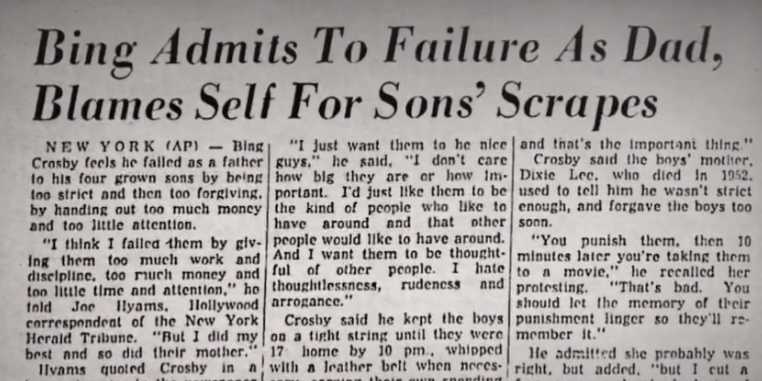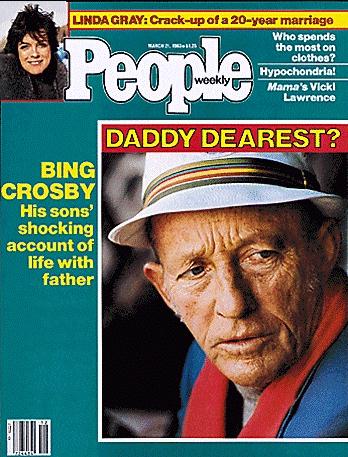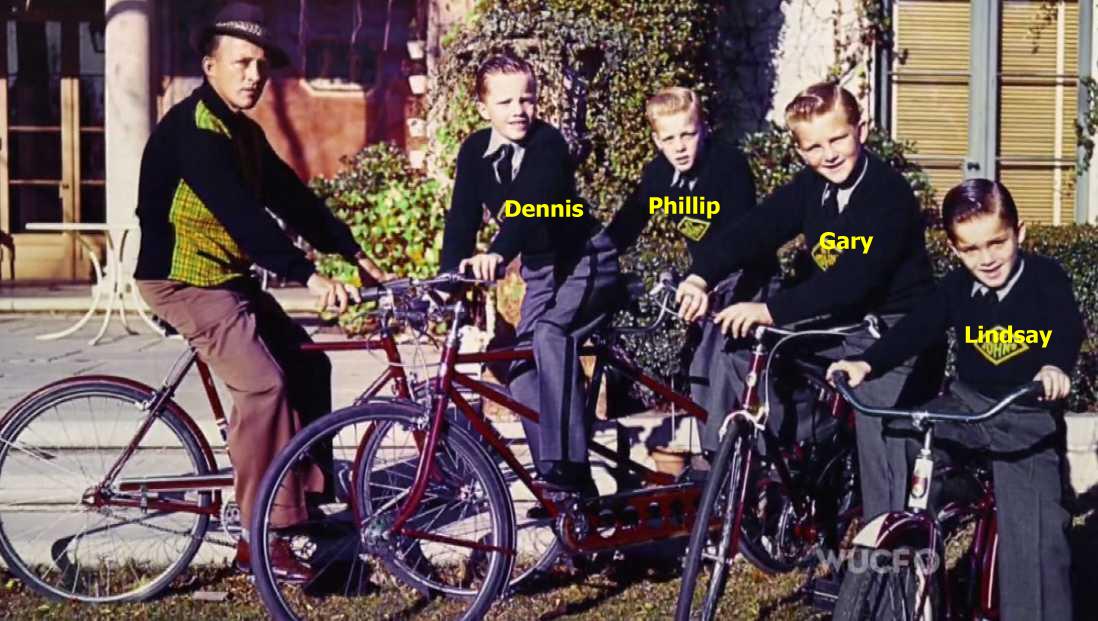

Some of the accusations are true; some are caricatures. One can do a 'hatchet job' on anyone by focusing on negative or controversial elements while ignoring alternative interpretations and relevant details. A convenient formula to boost sales is to cast a respected public figure in a sinister role. If you can't find dirt, at least you can find dust, which you can call dirt.
Listen to the mp3 Audio file of Children, recorded Jan. 19, 1976, by Bing Crosby (3:22 minutes) from the EMI compact disk "BING CROSBY: THE COMPLETE UNITED ARTISTS SESSIONS."
Probably the most damaging criticism of Bing came from his son, Gary, regarding Bing as a father. The fate of Bing's first family -- two sons (Lindsay and Dennis) committed suicide and a third (Gary) wrote an unflattering book about his Dad -- makes it clear that Bing was not especially gifted in familial skills. Bing's ideas of child-rearing were from an era before Doctor Spock, when the dominant maxim of child-rearing was "spare the rod, spoil the child." Bing's mother followed the same philosophy with her kids, and Bing's wife fully supported Bing's 'tough-love' approach to the four boys.
According to Bing's son, Phillip:
I'm real tough with my kids and our father was that way because he had been raised that way. His mother was a very beloved woman, but she was a tyrant. She had the fear of all -- my dad, his four brothers and my two aunts -- up until she died. ... So dad was very strict, but he was fair. Of course, our mother was very strict too, because we were four very high-spirited kids. She'd let us have it and then when Dad got home that night she'd give him the story. And we'd get it again! It was always a double-header. (Thompson, p156)In his 1953 autobiography Bing says that Dixie criticized him as too lenient with the kids:
There have been times when I couldn't tell whether I was Captain Bligh in a Hawaiian sport shirt or the cream puff of the world, for Dixie used to tell me that I was too lax, that I wasn't strict enough, and that I forgot our boys' transgressions too soon. She used to reproach me with, "You punish them; then ten minutes later you're taking them to a movie. That's bad. You should let the memory of their punishment linger so they'll remember it. (Call Me Lucky, 1953, p205-206)
It's clear from both Bing and his sons that Bing's motivation for the rigid discipline imposed on his sons was not sadistic but fundamentally well-intentioned.
Quoting Gary:
I'm sure father had received threats against us that we didn't even know about and probably will never know about. Not knowing about it made it tough for us. We couldn't figure out why we couldn't do what the other guys did. So to us it was like he was chaining us up. He was over-strict, but at least it was because he really cared and was something he really felt deeply about .... (Thompson, p87)Bing was determined to protect his kids from the risks of celebrity offspring and to raise something other than Hollywood brats. To this end Bing and his first wife conspired to play the role of drill sergeants to the boys. Unfortunately, the prescription did not fit the patients.
According to Gary:
It was inconceivable to him [Bing] that the outside world wouldn't treat us [Bing's children] the same as it treated him. He had never experienced being on the receiving end of hatred and anger. He liked everyone, and everyone liked him back. He was a very civilized man. We were not civilized. We were wild Indians, and he didn't have it in him to comprehend why we drank and carried on and did all the dumb things we did. (Going My Own Way, p284)The more his kids rebelled the more restrictive Bing became, setting up a sort of vicious cycle that ended in what has been called the paradise syndrome -- a family of polygamous alcoholics, quarreling amongst themselves, without purpose in life, living off their parents' trust fund, whining that their problems in life were all Dad's fault. At least Phillip didn't whine.
Gary wrote:
The old man [Bing] believed what he believed, and he thought he was doing right. He wasn't any tougher than a lot of fathers of his generation. And a lot of kids can handle that kind of upbringing without any difficulty. It was too bad that my brothers and I didn't buy it and turn out the way he wanted. That would have made it very comfortable for everyone. But whatever the reasons, we didn't. Linny and the twins clammed up like a shell. I bulled my neck and fought him tooth and nail all the way down the line. To my own destruction. The discipline just didn't work with us. (Going My Own Way, p285)

The trend amongst the simple-minded tabloid authors has been to place most of the blame for the fate of his first family on Bing. Even Bing fell into this trap. But why would Bing's actions play a more significant role in the development of the personalities of his kids than the behaviors of their mother? Dixie spent more time with the kids than did Bing, who, like the typical American father of the era, was gone most of the time earning the family income and hanging out with his sports buddies.
Dixie was a decent woman, but she suffered from shyness, depression and, eventually, alcoholism. She grew increasingly reclusive throughout the marriage, repeatedly turning down Bing's requests to accompany him on trips and social outings. Dixie's 'demons' may have driven her to attempt suicide on at least one occasion (January 1945). Although the tabloid authors usually blame Bing for the fate of the first family, a more profound influence on the kids would seem to be Dixie, who could have passed along to them her 'demons' genetically and/or environmentally. Dixie died of cancer at age 42, leaving Bing -- the family superstar and ultimate disciplinarian -- to become the 'sacrificial lamb' when son Gary decided to cash in on his self-destructive behavior at his father's expense.
Although Gary's fingerwagging at his famous father attracted the bulk of attention to his book, he also reveals that life outside the Crosby home was no featherbed either. The four boys were treated quite different by their peers from most children. And this 'special' treatment was often cruel and frightening.
Gary complained:
I didn't have to worry about my classmates buttering me up. Most of them seemed to feel that because I was Crosby's kid I had life easy and [that I] thought I was hot stuff. To even things out a bit, they took it upon themselves to make sure I paid my dues. It started as early as second grade. I remember being afraid to go out to recess because two of the boys in class gave me the sign they were going to whip me. I couldn't understand why they were angry.... A confused, frightened seven-year-old had no way of knowing what they really wanted. It seemed like maybe they wanted to whip my ass because they just didn't like me or my name or my father or something, but I couldn't be sure. I only knew it wouldn't help to argue with them and that my only choices were to fight back or run. That day I ran... They caught me and finished the job.... By the next year I had become fairly good at it [fighting]. I started to win some. The school had moved me ahead a grade and I was the smallest boy in class, but I had so much anger in me by then I could whip kids twice my size. (Going My Own Way, page 10)Bing's only daughter, Mary Frances, has addressed the special problems of celebrity offspring:
I feel very strongly about this. Being a celebrity's kid either goes one of two ways. You either become a mess or you become very strong. The questions aren't any different. "Who am I? What am I? Where do I want to go with my life?" All of those things everybody has to deal with. The only difference is, if you're a celebrity's child you have to deal with those questions earlier. If you don't establish a very strong sense of your own identity, people will project on you what they want, as so-and-so's son or daughter. (from Toxic Fame by Joey Berlin, page 319-20)The first set of Crosby offspring had to cope with a reclusive, alcoholic mother; a distant but strict father; and often harsh peer pressure because of their father's unprecedented celebrity. Yet in today's tabloid kingdom Bing gets almost all the blame for the fate of the first family. The conventional tabloid wisdom is to interpret Bing's increasingly harsh discipline of his four boys as the primary cause of their self-destructive behavior instead of a futile response to it. Bing has been transformed into a tabloid scapegoat, largely as a result of Gary's need to market his book.
Bing never claimed to be a great actor or a great singer, and certainly not a great father. In fact, he routinely claimed just the opposite. But the public had other thoughts. The public expected Bing to be great at anything he tried: crooning, acting, radio, television, sports .... and childrearing. To this end he was voted Outstanding Screen Father in 1946. When Gary burst the public's fantasies about life with Papa Bing in 1983 many reacted as if Bing had deceived them. In fact, all along the public had been projecting their fantasies onto Bing.

If Christmas has any universal meaning, that meaning is redemption. In a 1959 interview with columnist Joe Hyams, Bing blamed himself for the outcome of his first family:
I guess I didn't do very well bringing my boys up. I think I failed them by giving them too much work and discipline, too much money and too little time and attention. But I did my best and so did their mother. I'm getting another chance with Tex (Harry Lillis Crosby Jr. age five months). And with Kathy (Grant) as help I'll do better. (Bing Crosby Tells of Struggle with Four Unruly Sons, by Joe Hyams, San Francisco Chronicle, March 27, 1959)There is no doubt that Bing could have been a better parent to his first family. But if Bing had dropped dead in 1940 the boys would probably have turned out pretty much the same, except Gary would have had to find someone else to blame for his self-destructive behavior. Meanwhile, Bing's behavior toward his second family reveals that his redemption was real. Even Gary noted the difference:
He takes a lot more. You can see him looking at them [Bing's second brood] sometimes like he'd like to give them a shot in the back of the head -- but he kind of holds himself back a little and listens to them a little more. Whatever mistakes he thought he'd made with us, he is making sure he's not going to make with them. (Thompson, p220)

Bing spent considerably more time with his second family and moved them away from the Hollywood spotlight to the suburbs of San Francisco in 1964. His redemption was helped by his second wife, Kathryn, who was a much stronger, more secure woman than Dixie Lee. Many of Bing's buddies from the old days resented her for this. She was better able to cope with the floodlights we focus on celebrities and their families that make 'normal' family life nearly impossible.